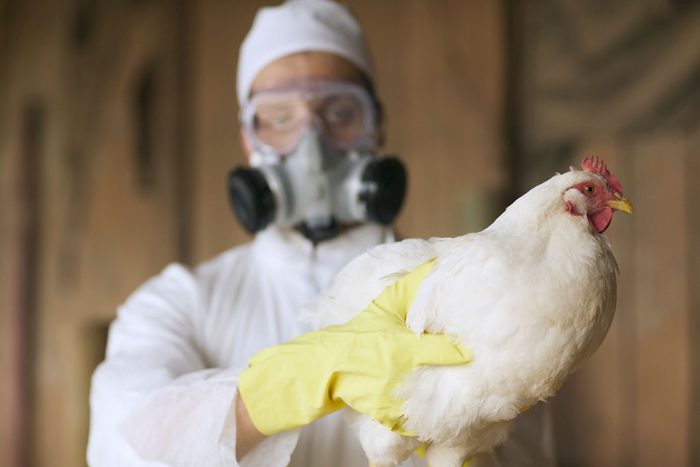What Is Avian Influenza and Can People Get It?
Updated: Jan. 17, 2023

The short answer is that humans are very unlikely to contract the bird flu. Here's what you need to know.
After several years of dealing with COVID-19, our collective antennae are up when it comes to new viruses. Flu season now is rife with worry. But when we hear about a deadly flu in animals, such as the swine flu pandemic of a decade ago, we immediately question: Can humans catch it? With news of the deadly outbreak of avian flu throughout the United States, a question in the back of people’s minds is likely: Can I catch the bird flu?
What to Know About the Avian Flu Outbreak
Over the past few months, the U.S. has seen an unprecedented outbreak of the H5N1 avian influenza that has killed tens of millions of egg-laying chickens nationwide. According to the Centers for Disease Control, this avian flu has affected 47 states and afflicted more than 57 million birds nationwide. That makes this the deadliest outbreak of bird flu in the nation’s history.
This particular strain of avian flu is highly contagious and kills 90% to 100% of chickens within 48 hours. Because of its virulence, health officials have had to preemptively slaughter millions of birds. All these chicken deaths have begun to affect the nation’s egg supply, and some states are seeing egg shortages and egg prices rise.
What’s worrying is that the virus is spreading beyond chickens. According to the Colorado Sun, wildlife officials in that state have seen the virus crossing over into the wild bird population, killing bald eagles and raptors. Colorado’s overwhelmed wildlife staff have called the nightmare scenario “the stuff of bad dreams” as it’s killed off wild bird species.
Can People Get the Bird Flu?
The short answer is yes, but it’s extremely unlikely. “Right now, the H5N1 bird flu situation remains primarily an animal health issue,” says the CDC. However, the agency is watching the situation closely “in case this virus changes to pose a greater human health risk.” The only case of a person being infected with H5N1 in the United States was recorded in April 2022. According to the CDC, the infected person worked closely with sick birds and recovered after a few days. Since most people don’t come into contact with live poultry, bird flu should not be a major concern.
However, if you are someone who does deal with live poultry, the CDC recommends the following precautions:
- Wash your hands after collecting eggs, handling birds or being in their living spaces
- Use hand sanitizer after any contact with birds if soap and water aren’t readily available
- Don’t bring birds into human living spaces
- Avoid getting scratched or bitten by birds
- Don’t kiss birds or bring them close to your mouth
In the meantime, the CDC says that it is safe for people to eat cooked eggs and chicken. Proper cooking of poultry and eggs to an internal temperature of 165˚F kills bacteria and viruses, including bird flu viruses.















